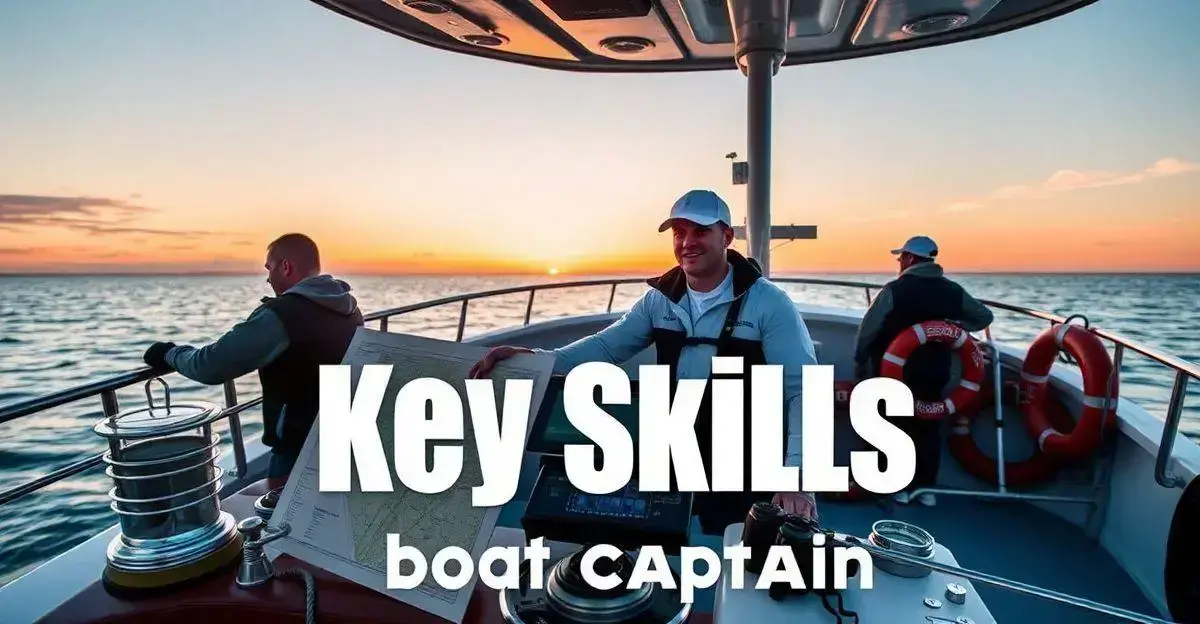Boat captain careers bring excitement and adventure for those who love the water.
Being a boat captain means taking the helm of various types of vessels, from yachts to commercial ships.
With the right training and skills, you can turn your passion for boating into a rewarding profession.
What Is a Boat Captain?
A boat captain is a skilled individual responsible for operating a variety of vessels on water. This role involves navigating boats safely and efficiently, ensuring the safety of passengers and crew while adhering to local maritime laws. A boat captain must possess extensive knowledge of navigation, weather patterns, and safety protocols.
Responsibilities include planning routes, managing schedules, conducting safety drills, and ensuring compliance with regulatory requirements.
Essential skills for a boat captain encompass navigation, leadership, decision-making, logistical management, and communication.
Key Skills for a Boat Captain

Being a successful boat captain requires a variety of key skills that are essential for navigating and managing vessels safely. First and foremost, navigational skills are crucial; this includes understanding maps, GPS systems, and the basics of nautical navigation.
A boat captain must also have strong leadership abilities to effectively manage the crew and ensure everyone’s safety and comfort on board. Additionally, decision-making skills are vital, especially in emergencies or unpredictable weather conditions.
Communication is another key skill, allowing the captain to relay important information clearly to the crew and passengers. Finally, logistical management skills help in planning trips, scheduling activities, and maintaining vessel operations efficiently.
Total awareness of these skills can foster increased safety and enjoyment on the water.
Education and Training for Boat Captains
To become a boat captain career, education and training are key factors that set the foundation for a successful career. Most boat captains start by obtaining a captain’s license, which is a requirement in many areas. This process typically includes completing a series of courses covering topics such as navigation, weather, safety procedures, and maritime law.
Many aspiring captains often attend specialized schools or maritime academies that offer comprehensive programs designed to prepare students for the responsibilities of managing a vessel.
After completing classroom instruction, practical experience is also essential. This may include apprenticeships or training under experienced captains to gain hands-on knowledge of operating different types of vessels. Additionally, obtaining certifications in first aid and CPR is often recommended, as these skills are critical for ensuring safety at sea.
Having a strong grasp of both theoretical and practical knowledge will not only enhance a captain’s skills but also increase job prospects in this exciting field.
Overall, the combination of formal education and real-world experience creates a well-rounded foundation for a successful boat captain career.
Where Boat Captains Work

Boat captains career work in various environments, from adhering to strict regulations on commercial vessels to ensuring memorable experiences on private yachts.
They may also guide tourists on scenic routes or lead search-and-rescue missions, showcasing their diverse skills in maritime operations.
Salary Expectations for Boat Captains
The salary expectations for boat captains can vary widely based on several factors. Typically, experienced boat captains working on commercial vessels or larger yachts can earn higher salaries, ranging from $50,000 to over $100,000 per year.
Factors affecting salary include the type of vessel operated, the area of employment, and the captain’s experience. For example, boat captains working in sectors like charter services or fishing industries may earn less than those in roles requiring specialized skills or certifications.
Additionally, tips from passengers can significantly boost a captain’s income, especially in the tourism sector. Overall, a career as a boat captain offers competitive salaries, with opportunities for growth depending on the industry and personal expertise.
Career Advancement Opportunities

Career advancement opportunities for boat captains are diverse and promising.
As boat captains gain experience, they may progress to managing larger vessels or even owning their boats.
Many captains choose to specialize in different types of operations, such as charter services, which can lead to higher earnings and greater job satisfaction.
Further, obtaining advanced certifications can open doors to opportunities in specialized areas like marine safety training or education.
Captains may also have the chance to transition into shore-side management roles or marine consulting, leveraging their experience in the industry.
Networking within the maritime community and joining professional organizations can provide valuable connections and resources for career growth.
By continuously improving their skills and knowledge, boat captains can significantly enhance their career trajectories.
Challenges Faced by Boat Captains Career
Boat captains face several challenges that can affect their daily operations. One significant challenge is weather conditions. Capable boat captains must constantly monitor weather patterns and make real-time decisions to ensure safety on the water. This can include adjusting routes or delaying trips due to storms or high winds.
Another challenge includes crew management. Captains must lead their team effectively, ensuring that everyone is trained and ready for emergencies. Conflict resolution skills are also essential, as disagreements among crew members can arise during stressful situations.
Additionally, boat captains must deal with the regulatory environment. This includes understanding local laws and ensuring that their vessel complies with safety regulations, which can vary by region.
Finally, maintaining vessel upkeep is crucial. Regular maintenance can be costly and time-consuming but is essential for safety and performance. By successfully navigating these challenges, boat captains can ensure safe and enjoyable experiences for their passengers.
How to Start Your as a Boat Captain Career

Starting your career as a boat captain requires several important steps.
First, educational background plays a crucial role. Most boat captains need to complete courses related to navigation, safety, and maritime laws. You can find these courses at maritime academies or online.
After acquiring the necessary education, it’s essential to obtain a captain’s license. This license is often required to operate a boat professionally. To get this license, you must pass maritime exams that test your knowledge and skills.
Next, gaining practical experience is vital. Many new captains start as deckhands or in other entry-level positions to learn the ropes from experienced crew members.
Networking with other professionals in the marine industry can also prove helpful. Joining maritime organizations or attending industry events can provide you with valuable contacts and job leads.
Lastly, always stay updated with the latest boating technology and safety practices. Continuous education and training will help improve your skills and enhance your employability in this exciting field.
Charting Your Course: Steps to a Successful as a Boat Captain Careers
Becoming a boat captain is a rewarding journey filled with challenges and opportunities. The path involves gaining essential knowledge, practical experience, and the right certifications.
As you navigate this career, remember that continuous learning and skill improvement are crucial. By focusing on leadership, safety, and operational excellence, you can thrive in the maritime industry.
Whether you work on commercial vessels or private yachts, the satisfaction of guiding a boat and ensuring the safety of passengers is unparalleled. Embrace the adventure and start your journey toward becoming a successful boat captain.
